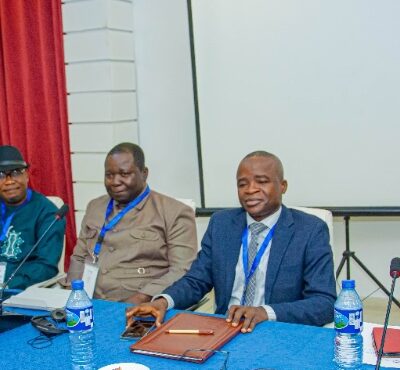
BY OLAPEJU OLUBI
The Nigeria Civil Aviation Authority (NCAA) has thrown its weight behind an innovative passenger-centric solution designed to address longstanding challenges in Nigeria’s aviation industry, particularly flight disruptions caused by operational, weather-related or other unforeseen circumstances.
The newly introduced system, known as the “Propel Reprotection System,” is a tech-driven innovation developed by a consortium comprising Aviation Assist Hub, Avitech Technology Solutions, and Leadway Assurance.
The solution aims to provide seamless re-protection for air travelers by enabling airlines to quickly transfer affected passengers to other partner carriers without financial loss or service interruptions.
According to its developers, the Propel platform allows airlines to interline efficiently during critical periods, ensuring passengers are swiftly rebooked onto alternative flights, thereby safeguarding airline revenues while enhancing passenger satisfaction.
Speaking at the unveiling, NCAA Director General, Captain Chris Ona Najomo, represented by the Director of Public Affairs and Consumer Protection, Mr. Micheal Achimugu, praised the collaborative spirit behind the innovation.
He described the Propel platform as a timely intervention that aligns with the government’s vision of minimizing flight disruptions across the country.
“Ladies and gentlemen, we are on the threshold of history of what we are able to achieve for which we are gathered here for. It is not a day for flowery words. The Honourable Minister wants flight disruptions reduced to the barest minimum. In this industry, the passenger is the reason every other stakeholder exists. They are entitled, therefore, to better services and in accordance with global best standards,” Achimugu said.
He further highlighted that the DG, Capt. Najomo, is a passionate advocate for passenger rights.
“The DGCA, Capt. Chris Najomo is himself, a staunch protector of consumer rights, and this is why we are proud to introduce to you, the PROPEL solution as initiated by Aero Assist Hub. I will allow the company to explain this system and how it helps with interlining. If they secure your buy-in, and I hope they do, we may just make history by fixing the most critical aspect of civil aviation in Nigeria,” he said.
The NCAA affirmed that several domestic airlines have already signaled interest in integrating the system, with discussions ongoing to finalize modalities for adoption.
With its implementation, the authority believes flight delays will be drastically reduced, confidence in domestic airlines will improve, and passenger experience will be significantly enhanced.
Olumide Ojutalayo, Managing Director of Aero Assist Hub, emphasized the consortium’s commitment to solving one of the industry’s most frustrating problems.
“We are a consortium with three organisations. We have Avitech Technology Solutions, experts and industry leaders in aviation sector. We have Leadway Assurance. We basically crafted this solution, working with these two organisations. The idea is to put a final solution to this whole chaotic problem of flight disruption in Nigeria. We are not just coming with an idea; we are also coming with finance,” he said.
Ojutalayo explained that the solution also addresses the financial strain airlines face during disruptions.
“We understand what the problem has been; many airlines are working with very thin margin, and when there is a disruption, it becomes a problem for them. So, we are trying to also ease their cash flow, support that immediately for them to build with this brilliant well-thought-out solution. We are hoping to roll out the pilot scheme within the next couple of weeks, so that we can go to the field and solve the problem of the Nigerian passenger,” he added.
He noted the importance of gathering all stakeholders—airlines, the NCAA, and passengers—in the same room to foster open dialogue and effective customization of the system.
“Interestingly, we’ve been talking to them individually but the important thing for us today was having everybody in the room – NCAA, airlines and even some passengers – so that we can have everybody in the same place sharing experiences and industry knowledge on how this works and how it can be tweaked.”
He added: “Flying season has started and we are expecting disruptions when the rains and bird strike start. So, we are on standby. The pilot phase will begin in August and run for eight months, then continue to the next phase.”
Funke Junaid, Head of the Legal Unit at Aero Assist Hub, highlighted that the Propel solution complements, rather than alters, existing passenger rights under NCAA regulations. “It is something that comes as a solution to what has been happening in the industry, regarding delays and cancellations.
From a legal perspective concerning the customers’ rights, for example, because it’s all about the customer basically, what we are doing here, the customers will be deriving their rights from the airlines; because it is actually the airlines and PROPEL, the consortium, that will be entering into a contractual partnership,” she explained.
She added, “So, all the normal protected customer rights are still in existence, and that stands between the customer and the airlines. It is a win-win for the industry. The customer remains protected based on the NCAA’s regulations. All their rights and benefits from the airlines remain protected. What we are doing with the airlines is to enhance that, and that’s why we have these contractual obligations and partnership with the airlines to protect the customer.”
Junaid noted the strong level of engagement from airline representatives, which led to an extended feedback session.
“From the responses we have gotten today, the airlines have keen interest in the idea. We initially scheduled an hour for the question and answer and feedback session.
But we have had over two hours now. It shows their keen interest in this and they are really opening up and coming to us with their concerns, questions and suggestions as experts in the field.
And we are taking this feedback to our drawing board and working with them to achieve the very best with this initiative.”
Diana Mulili, a representative of Leadway Assurance, underscored the need for a solution tailored specifically to Nigeria’s air travel realities.
“This is how we are looking at it. When we approached this problem, we realized that it was a growing problem across the industry, and we needed to create a product that would work to solve the local problem. So, none of our other existing products, travel products, are going to solve for this.”
“What you’re actually interacting with is a product that has been co-created with the industry. We have talked to all the different stakeholders, including passengers, who have told us how frustrated they get when they’re at the airport for over four hours, sometimes even up to 10 hours and more. And yet there is no solution that seems to be coming,” she said.
Mulili continued: “A minimal insurance premium guarantees a passenger that should any disruption happen, they will get an alternative on another airline, and it’s very seamless. You don’t have to care about the back end. We take care of the entire back end, and all the passenger sees is, there’s a disruption. Is that hour three or four, they will move on to another airline and they get to their final destination.”
She noted that although initial plans focused on refunds and minor compensations like airport meals, passenger feedback indicated that what they truly want is to reach their destinations without delay.
“That is actually what PROPEL is providing—helping passengers get to their destination, regardless of their flight delays and cancellations experienced.”
Mulili also praised the platform’s adaptability, saying: “The platform that has been built with our partner AV tech is very robust. I’ll say robust, because as we interacted with the different stakeholders, we realized some are ready for full integration, and others are not yet ready. They’d still want to have a less integrated process.
So we are actually able to adapt to whichever airline’s technology ecosystem, because all we care about is when a disruption happens, the ease of the airline accessing the platform, using it to help them protect their passengers seamlessly.”
With a pilot launch scheduled for August, the Propel Reprotection System is being heralded by stakeholders as a transformative step in Nigeria’s aviation landscape, one that places the passenger at the heart of every decision, and promises to raise service standards across the board.





